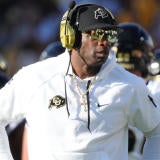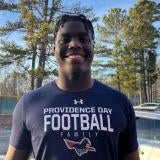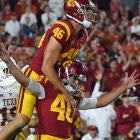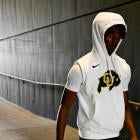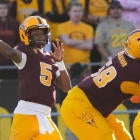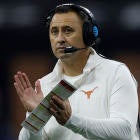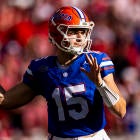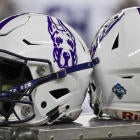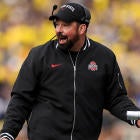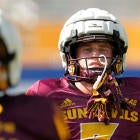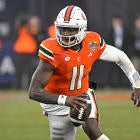It wasn't the 2006 Rose Bowl, but it didn't have to be. The 2017 edition of Texas-USC was its own brand of beautiful, even if that beauty was in the blemishes and flaws peppered throughout the game. College football never ceases to amaze like that.
It took 60 minutes, two overtimes and a million momentum swings for the Trojans to win 27-24. It'll ultimately count as another notch in USC's resume as it tries to make a College Football Playoff run. It'll be marked as a painful loss for Texas as it tries to find some sign that better days are not just around the corner, but in actual proximity.
In the meantime, there's a lot we learned about both teams in this mostly ugly, but never dull game. Here's what to take from both sides.
1. USC has concentration issues, and that's worrisome: It's tough to get college football players to perform consistently for 12, 13, 14 or 15 games. They're 18-to-22-year-olds. Concentration lapses happen. Neither USC nor Texas played its best offensive game on Saturday. For the Trojans, though, this was the second time in three games in which they didn't come out firing in sync on offense or special teams. It happened in Week 1 against Western Michigan and then again against the Longhorns. Outside of Deontay Burnett making some hero catches, USC's receivers dropped way too many passes.
Quarterback Sam Darnold has a tremendous arm, and I think he knows it. Sometimes, that comes back to bite him. He'll drop some dimes rolling out of the pocket. He'll thread needles for which there's no good defense. And then he'll turn around and throw a ball high over an open receiver because his feet weren't set. Texas did a good job of getting pressure on Darnold, but some of his mistakes were plain bad mechanics. With Texas taking away the run game, USC's passing attack needed to connect. It didn't for the most part, at least not until very late in the game spanning into overtime. Texas wasn't disciplined enough itself to take advantage of USC's mistakes and penalties -- more on that later -- but eventually you have to figure another team will be. Coach Clay Helton has to find a way to tap into this team's focus.
2. Still, the Trojans can be so dangerous: When the offense is clicking, USC is almost unstoppable. Darnold's arm can place balls in places few others can regardless of his footwork. (This is both a blessing and a curse.) Ronald Jones and Stephen Carr are explosive runners that create balance within the offense and can grind out wins. There are so many options and all it takes is one play for this group to go from completely stalled to alive. The switch is frighteningly easy to turn on. Going back to the Week 2 win over Stanford, that's what USC should look like when it's playing at its best.
3. Texas made a lot of improvements from Week 1, which is good: If you had said three weeks ago that this Texas defense -- the same one that allowed Maryland to run all over it -- would hold USC's vaunted rushing attack to 1.9 yards per rush, there's a good chance you would have been laughed out of the room. What a difference those few weeks have made, though.
The matchup of the Longhorns defensive line was a pleasant surprise. Poona Ford was one of the heroes of the game with the way he was able to shed blocks and stuff runs. Linebacker Malik Jefferson was excellent and showed the type of instincts, decision-making and closing speed that has NFL scouts salivating. DeShon Elliott's two interceptions were critical plays. All three levels of Texas' defense were so bad against Maryland. To turn around like this is an encouraging sign.
It wasn't limited to defense, either. Quarterback Sam Ehlinger -- a true freshman playing on the road -- orchestrated a gutsy drive at the end of the fourth quarter for a go-ahead score. Collin Johnson finally looks like a true No. 1 receiver who can make tough, contested catches and high point balls. It's a tough loss to swallow, but there's a lot to be happy about.
4. Texas still had a lot of self-inflicted wounds, which is not good: Now for the bad. USC wasn't the only team with mental lapses.Texas' self-inflicted wounds continue to haunt this team. The penalties (10 for 73 yards) and turnovers, especially on potential scoring drives, kept Texas from taking advantage of USC's mistakes. Ehlinger's interception inside USC's red zone (off of a Trojans turnover, no less) was a gut punch. The quick-strike score by the Trojans right before the half was right out of the Texas playbook from the Charlie Strong era. It's almost like the Horns can't help themselves at times. So while there were plenty of signs that Texas is in fact getting better, a lot of the same mistakes that doomed it under Strong showed up again on Saturday. And those mistakes in the past weren't easily fixed.







